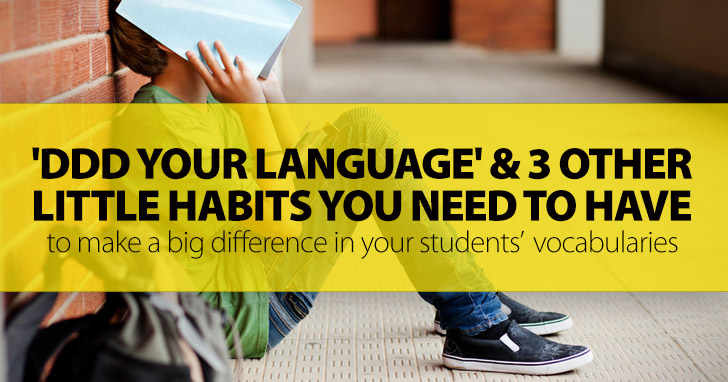How complex are your students’ vocabularies? Are your habits increasing their lexicons or limiting them? Do you know just how much influence you have on how much your students learn?
If you have been an ESL teacher for a while or if you’re still new to the field, these simple habits can make the difference in how fluent your students are in the language they are learning. And they will certainly help build complex and rich vocabularies in your students. The best news of all? You may already be doing them!

Try These 4 Simple Habits That Build Students’ Vocabulary:
-
1
DDD (Don’t Dumb Down) Your Language
Without thinking about it, ESL teachers tend to simplify what they say and how they say it.One of the easiest ways to help your students increase their vocabulary recognition and usage is to keep your own language as natural as possible. That’s not always an easy thing to do when you are an ESL teacher. Without thinking about it, ESL teachers tend to simplify what they say and how they say it. They choose words they expect their students to know rather than ones they don’t. I know it’s true. I’ve caught myself doing it many times. I’d say “difficult” rather than “hard” or “easy” rather than “simple”, “quick” rather than “fast”. I’ll bet you have, too. And while our students might understand what we are saying more often, this language modification isn’t helping them increase their vocabularies. In fact, it’s only reinforcing that what they already know is enough. If you have been teaching ESL for a long time, it may be tough for you to go back to a more natural and complex level of vocabulary in your speech, but that doesn’t mean it isn’t worth it. Try to talk to your ESL students as you would to native speakers. Yes, you will end up doing more explaining up front, but in the long run your students will benefit by having more complex and rich vocabularies.
-
2
Use Real Materials Rather Than ESL Designed Ones
Another temptation for the ESL teacher is to use materials specifically designed for use in the ESL class. Like our modified language, these materials tend to use words your students already know so that comprehension comes easier. While this is easier in the moment, it’s not as beneficial to your students long term. A better option is giving them realia, or real English materials written for native speakers. Have you ever tried to use a simple newspaper article in class? I’ll bet you learned just what I did: it’s not as simple as you thought. Though the vocabulary is familiar to you, your students will encounter word after word that they do not understand and have not learned in just one simple little article. This may tempt you to give up, to stick to the articles fabricated especially for your intermediate reading text. Don’t do it! Students need exposure to these types of realistic materials. The articles or song lyrics or short stories you bring to class will be challenging, yes, but they will also be motivation to learn more and retain more. Plus they’ll motivate your students to adopt habit number three for developing and maintaining a more complex vocabulary:
-
3
Stop Using the Dictionary
Whoa! You say. How can an ESL teacher possibly encourage getting rid of the dictionary? It’s because of the way the brain learns and retains language. When a person learns new words, whether it’s in a first or second language, he makes connections to what he already knows. Think of new vocabulary in the brain like a scrabble style word grid. Each word connects to another that is already there. When ESL students use a bilingual dictionary to learn new vocabulary words, the connections still happen, but the connections happen between words in the student’s first language (that he already knows) and the new English words. That means when the student’s brain tries to access that new word in English, he will have to do so through words in his first language, since they are where that new word is attached. This means your student will have to first compose what he wants to say in his first language and then translate it into English. Not smooth. When students rely on their first language to understand and access vocabulary in English, they are not moving toward fluency. Their language will likely be staccato, hesitant, or even nonexistent in the worst cases. Encouraging students to learn the meaning of new English words with the English words they already know will improve fluency and make them less dependent on their first language. It will also keep the mental translations to a minimum. Ultimately, fluency is the goal in second language instruction, so stick to an English-English dictionary and leave the bilingual ones at home!
-
4
Keep Your Door Open
No, that’s not to say fresh hallway air makes students better learners. What it does mean is this. ESL classrooms that encourage frequent visitors will expose students to a greater variety of vocabulary. It goes back to the first point – ESL teachers tend to modify their language to make comprehension easier for their students. It happens without thinking, and it’s very tough to break out of that cycle. One way around it is to invite native speakers to your classroom any chance you get. If your guests are not accustomed to working with ESL students, they will invariably expose your students to a greater vocabulary than you will on your own. More than that, even ESL teachers whose vocabularies are simplified do so in different ways. So even if your guests are other ESL teachers, your students will still benefit from listening to them. Use that as an excuse to trade classes with another ESL teacher from time to time or have combined lessons. Invite guest speakers for special occasions. Take frequent field trips. Do everything you can to get language partners into your ESL classes. All of these things will give your students exposure to greater and more complex vocabularies, and getting exposure to a greater variety of words is the first step in your students’ building a more extensive vocabulary themselves.
Vocabulary is one of the more important aspects of learning English.
Whether students plan on using their language skills for education, business, or pleasure, the more words they recognize and can use, the better their communication skills will be. If you adopt these simple habits in your ESL classroom, and maybe you already have, your students will thank you, and you can rest assured that you have done the best for your students that you can.
What simple habits have you found effective for building your students’ vocabularies? We want to know! Share them in the comments section below.
P.S. If you enjoyed this article, please help spread it by clicking one of those sharing buttons below. And if you are interested in more, you should follow our Facebook page where we share more about creative, non-boring ways to teach English.







